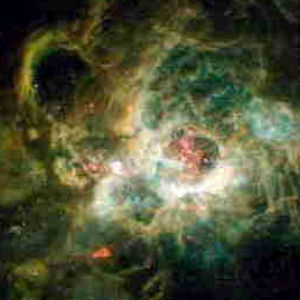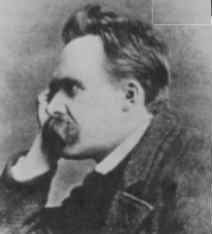Twin Universes
 Years ago I remember reading a book by Isaac Asimov (one of his many collections of essays) in which -- if I recall correctly -- he provided answers to questions that he had never addressed before, or that wouldn't have been a good fit for any of his other books. One of these questions was, "What lies beyond the universe?"
Years ago I remember reading a book by Isaac Asimov (one of his many collections of essays) in which -- if I recall correctly -- he provided answers to questions that he had never addressed before, or that wouldn't have been a good fit for any of his other books. One of these questions was, "What lies beyond the universe?"
Asimov's glib initial response was "non-universe." He then spent some time talking about what non-universe might be. Whatever it is, one would think that it would also be the correct answer to the question, "What came before the universe?"
But maybe not:
Before the Big Bang: A Twin Universe?
Until very recently, asking what happened at or before the Big Bang was considered by physicists to be a religious question. General relativity theory just doesn’t go there – at T=0, it spews out zeros, infinities, and errors – and so the question didn’t make sense from a scientific view.But in the past few years, a new theory called Loop Quantum Gravity (LQG) has emerged. The theory suggests the possibility of a “quantum bounce,” where our universe stems from the collapse of a previous universe. Yet what that previous universe looked like was still beyond answering.
Now, physicists Alejandro Corichi from Universidad Nacional Autónoma de México and Parampreet Singh from the Perimeter Institute for Theoretical Physics in Ontario have developed a simplified LQG model that gives an intriguing answer: a pre-Big Bang universe might have looked a lot like ours. Their study will appear in an upcoming issue of Physical Review Letters.
“The significance of this concept is that it answers what happened to the universe before the Big Bang,” Singh told PhysOrg.com. “It has remained a mystery, for models that could resolve the Big Bang singularity, whether it is a quantum foam or a classical space-time on the other side. For instance, if it were a quantum foam, we could not speak about a space-time, a notion of time, etc. Our study shows that the universe on the other side is very classical as ours.”
So if a pre-Big Bang universe looked a lot like ours, does it follow that our universe looks a lot like a pre-Big Bang universe? Remember the old computer programming joke that goes...
__AM I IN A LOOP?
__AM I IN A LOOP?
__AM I IN A LOOP?
__AM I IN A LOOP?
 The idea that our universe sprang from one much like it puts me in mind of Friedrich Nietzsche's idea of eternal recurrence. Corichi and Singh talk in terms of our universe being a lot like the one that came before it, but nothing I read above rules out the possibility that this universe is a dead ringer for its ancestor. If that were the case, if the current universe were an exact copy of the one that came before, it would only be reasonable to expect that the next one will also be exactly the same. Or as Nietzsche put it:
The idea that our universe sprang from one much like it puts me in mind of Friedrich Nietzsche's idea of eternal recurrence. Corichi and Singh talk in terms of our universe being a lot like the one that came before it, but nothing I read above rules out the possibility that this universe is a dead ringer for its ancestor. If that were the case, if the current universe were an exact copy of the one that came before, it would only be reasonable to expect that the next one will also be exactly the same. Or as Nietzsche put it:
This life as you now live it and have lived it, you will have to live once more and innumerable times more; and there will be nothing new in it, but every pain and every joy and every thought and sigh and everything immeasurably small or great in your life must return to you-all in the same succession and sequence-even this spider and this moonlight between the trees, and even this moment and I myself. The eternal hourglass of existence is turned over and over, and you with it, a grain of dust.
How many times have you read this blog post? How many times have I typed it? Is it possible we have each done these things a dozen or a hundred or a billion times, and that we will continue doing so for all eternity?
Also -- and this is the part that makes my head twinge just a bit -- if it is exactly the same thing occurring over and over and over and over...exactly the same...does it really make sense to talk in terms of the number of times it happens? Is one instance of the universe somehow different from an infinite repeating series of the same universe? How? And to what observer?
UPDATE: Michael Darling directs us to this talk by Stephen Hawking, in which he asserts that the universe could have spontaneously created itself out of nothing. As far as satisfactory explanations go, this one has to be the bottom of the barrel. Which doesn't mean it's wrong, of course.



Comments
"Bottom of the barrel"? Really?
My god, man! He holds Newton's Mathematics chair at Cambridge- have you no respect?
And the key parts are : "my god man !"
It's a head twister to be sure. Well- before some event there was nothing, not even time, and then there was. poof.
As proof I offer... nothing.
Now, for me, I fall into the more foolish category of "so what?" Or what do we do now? Yes it would be intellectually satisfying to know how everything started- and how it will end - but God doesn't consult me in any way I can understand so I don't know, I'm not going to know, and yet I can still eat and get laid.
Well, anyway I can eat whenever I want- and I love the fluffy carbs.
So- unless it's going to help the Cubs break the 100yr drought- I'm not sure I care. Other than in a potentially intellectually satisfying way.
Posted by: MDarling![[TypeKey Profile Page]](http://www.blog.speculist.com/nav-commenters.gif) |
April 12, 2008 06:00 AM
|
April 12, 2008 06:00 AM
Just to clarify -- that "bottom of the barrel" refers to how (emotionally) satisfying the explanation is. I would hardly put myself in the position of attempting to judge the elegance of Hawking's reasoning nor the eloquence of his explanation.
I'm unqualified to do either, for the reasons you state.
Posted by: Phil Bowermaster![[TypeKey Profile Page]](http://www.blog.speculist.com/nav-commenters.gif) |
April 12, 2008 09:48 AM
|
April 12, 2008 09:48 AM
Corichi and Singh talk in terms of our universe being a lot like the one that came before it, but nothing I read above rules out the possibility that this universe is a dead ringer for its ancestor.
Well, nothing except the sort of basic physics you learn while flipping coins as a six year old. Even if the physical laws are identical, there are behaviors right down to the quantum level that are not only unpredictable, but as far as we know completely random. And over time, little differences add up to big differences. The last iteration, and the next, would have protons, neutrons, oxygen, stars, galaxies ... but they are very unlikely to have people, sitting on Earth, reading and writing a Speculist blog.
Posted by: Charlie (Colorado)![[TypeKey Profile Page]](http://www.blog.speculist.com/nav-commenters.gif) |
April 12, 2008 12:53 PM
|
April 12, 2008 12:53 PM
As I read the article, it seems that there are far fewer differences -- or I should say the differences that occur are at a far smaller level -- when comparing these two universes than when comparing successive coin flips. It's not just the same physical laws, it is precisely the same amount of matter, etc. The initial differences between the two -- if any -- can be identified only at the Planck scale.
The last iteration, and the next, would have protons, neutrons, oxygen, stars, galaxies ... but they are very unlikely to have people, sitting on Earth, reading and writing a Speculist blog.
Woody Allen's take on Eternal Recurrence was that he hopes it's not true -- he wouldn't want to have to sit through the Ice Capades again. People in the next universe should be so lucky as to have The Speculist to read!
Interestingly, you can have Eternal Recurrence even without exact duplicates repeating back-to-back. Assuming a finite (though very large) number of particles in the universe -- and an endless succession of twin universes -- we would inevitably cycle through the exact same configurations over and over again. There might be trillions and trillions of iterations between each instance of the Speculist (or Ice Capades) universe, but it would keep coming up, as sure as the number 19 on a roulette wheel.
Posted by: Phil Bowermaster![[TypeKey Profile Page]](http://www.blog.speculist.com/nav-commenters.gif) |
April 12, 2008 02:42 PM
|
April 12, 2008 02:42 PM
Ah, but you said the next universe, and the immediately previous one. Even if there are differences only at the planck scale, you'd have to convince me the system isn't sensitively dependent --- which would mean that Planck-scale differences would still lead to bigger ones.
I think Julian Barbour suggests the universe is a (has a) configuration space of around 10^500 configurations, so yeah, you've expect eventually to exhaust them, and in fact to exhaust them infinitely often.
Posted by: Charlie (Colorado)![[TypeKey Profile Page]](http://www.blog.speculist.com/nav-commenters.gif) |
April 13, 2008 09:59 PM
|
April 13, 2008 09:59 PM
Charlie --
I wonder when in a universe's lifespan this quantum bounce occurs. We were talking on the podcast last week about the heat death of the universe, which will occur somewhere after about 10^150 years. Let's say the bounce occurs much earlier than than that, on average, but still in a much older universe than we currently occupy, say one that is 10^100 years old. So you have to wait 10^100 years for each of -- if not 10^500 universes, then at least some significant subset of that number -- to go by before coming back to "our" universe.
This kind of talk makes me dizzy.
BTW, I'm a big Julian Barbour fan; I once won a prize for a speech I gave about one of his books.
Posted by: Phil Bowermaster![[TypeKey Profile Page]](http://www.blog.speculist.com/nav-commenters.gif) |
April 15, 2008 08:40 PM
|
April 15, 2008 08:40 PM